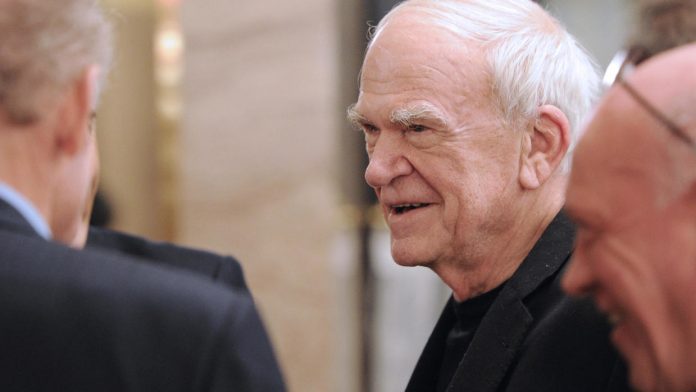Goodbye, Milan Kundera. You showed us that whereas a mere novel is a collection of inventions, literature is a rendering of the truth
What makes classic literature? Where does a mere story end and literature begin? The exploration is a worthy way, I think, to celebrate Milan Kundera.
Kundera, who died last week, was a Czech novelist who spent more of his life in comfortable “exile” in France. He moved there in the 1970s after having already achieved notoriety by upsetting the Communist authorities with edgy novels like The Joke. In that book, the student Ludvik Jahn derails his promising career with a joke about the Communists which is taken badly out of context. Misery follows for Jahn, and life lessons for the reader.
I first encountered Kundera via what some (but by no means all) will consider his magnum opus, The Unbearable Lightness of Being. The novel tells the story of the surgeon Tomas, who is torn between his devoted (but boring) wife Tereza and his free-spirited (and reckless) lover Sabina. As you might expect, Tomas gets into all kinds of trouble that does neither his career nor either of the women much good.
At the time of my reading this book, in the late 1980s, I had already had some early flirtations with what one might consider literature. I was uncertain about what exactly made it worthy of the label. My sense was just that with storytelling, as with another ancient vocation, you simply know it when you see it.
For example, from early high school days I knew this applied to the American author Kurt Vonnegut. I loved that his early career was as a public relations writer for General Electric, and that he only began to be published in middle age (I believe I foresaw the evils of ageism correctly in this case). But when he did, with novels like Player Piano and Slaughterhouse Five – good lord, was it ever worth the wait.
Vonnegut bent toward the whimsical, and some of his works flirted with science fiction. So it was with what may be my favorite of his works, The Sirens of Titan. There, characters with names like Malachi Constant and William Niles Rumfoord travel through space and time which enables them to pretend to make predictions, leading to the establishment of a religion called „The Church of God the Utterly Indifferent.”
It’s a vision I can get behind: The central tenet is that the universe is vast, indifferent, and devoid of purpose or meaning, so people should live with a sense of acceptance. The book contains the brilliant line, by a character who is thrust onto a public stage to explain the unexplainable: “I was a victim of a series of accidents, as are we all.”
Of course I also enjoyed Catcher In the Rye and the occasional John Irving novel (The World According to Garp made a great impression especially, as I recall). But it was Kundera who set me on my literature-loving course.
What made it special? What made Kundera so stand out? I want to believe it was inspiration; but more realistically, I suppose that as with most things, there is a system of skillfully deployed devices. With Lightness, it went as follows.
First, the story seemed to actually operate in aid of a philosophy. For entire passages Kundera would pause the narrative – as with other novels like The Farewell Waltz, Laughable Loves and The Book of Laughter and Forgetting – and begin to muse about eternal truths. These musings were not trivial and they were not obvious. In some cases they struck me as wrong, but they were always riveting and gave you the feeling of being in a collusion with the writer – a discussion of sorts where perhaps you are not heard but you are present nonetheless.
Second, the writer did not merely report on what was said and done but offered a window into the souls of the protagonists (“People usually escape from their troubles into the future; they draw an imaginary line across the path of time, a line beyond which their current troubles will cease to exist. But Tereza saw no such line in her future.”)
Third, there was deeply moving drama utterly devoid of the need for a happy ending. The conclusion of Lightness is shattering – as the reader learns indirectly, via a third character, of the last day in the lives of Tomas and Tereza. And as the description of the event unfolds, one realizes that despite all that went before, on this day they were genuinely happy – which renders what follows quite shattering and unforgettable.
I remember reading the last, non-chronological line – the strains of the piano and violin rose up weakly from below. I recall putting down the book with a sense of awe, sensing I was in the presence of a version of greatness. I do not often have this sense, and so I resolved to read everything the man ever wrote and would ever henceforth write. And this, I actually did.
Kundera came up with some weird stuff, to be sure (e.g., “The struggle of man against power is the struggle of memory against forgetting”). I forgave these lapses because in the grand scheme of things, in a world overflowing with vulgarity and bullshit, his writing projected truth.
For example: “For there is nothing heavier than compassion. Not even one’s own pain weighs so heavy as the pain one feels with someone, for someone, a pain intensified by the imagination and prolonged by a hundred echoes.”
Or this: “Human time does not turn in a circle; it runs ahead in a straight line. That is why man cannot be happy: happiness is the longing for repetition.”
Jesus, Maria y todos los santos! You cannot buy that level of quality these days. It gave me the understanding that whereas a mere novel is a collection of inventions, true literature is a rendering of the truth.
Kundera, more even than Vonnegut, cemented my love for the brilliant person of letters. I have since found fidelity to others – Graham Greene, W. Somerset Maugham, Stefan Zweig, Guy de Maupassant, Vladimir Nabokov, Ivan Turgenev, Kingsley Amis, Evelyn Waugh – the list goes on, but sadly all of them are dead. It seemed like I was an appreciator mainly of things past.
Kundera was the last one to soldier on, keeping the flame of literature alive in the current day and age – until July 11, when he died at 94.
Who will take up this mantle? Ian McEwan? Alaa Aswany? Perhaps my former AP colleague Tom Rachman, who has written a couple of brilliant books?
I cannot say. Conceivably there is no one, and the essential stories have been told. I hope to be proven wrong.
















